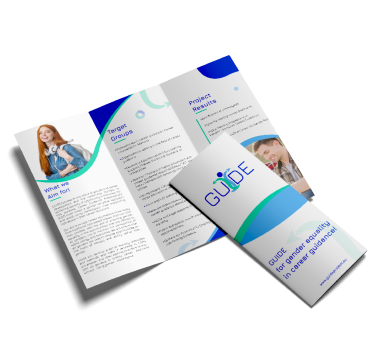About GUIDE
GUIDE focuses on the issue of gender & career development and the continuing barriers to achieving equality of opportunity in this area.
For this purpose, Career Guidance Professionals (CGP) must adopt a gender-sensitive approach and avoid using stereotypes when supporting individuals in their career decisions.
.

GUIDE aims to develop tools to support increased awareness of gender inequality in career choices.
GUIDE tackles discriminant practices and offers a timely contribution to mitigating existing imbalances in the access to career opportunities that persists today across gender.
The project aims to help career counselors move away from biases based on traditional roles that can limit choices to ensure equal opportunities for all genders without tapping human talent and resources. It is essential to ensure that all genders can choose among opportunities based on interest and ability, rather than gender.
GUIDE also contributes to achieving higher education institutions’ goals of building inclusive higher education systems, by developing tools and methods, to support the development of gender-sensitive career pathways. This aims to promote gender equality and gender balance in career choices and the labour market for all genders.
GUIDE will develop a set of learning resources and methods and make available to CGPs, universities, and other training providers to support all genders in making career decision without using gender stereotypes.
Gender influences a wide range of career-related attitudes, behaviours, and outcomes. This includes career choices, career experiences, work attitudes, other people's perceptions, and career outcomes. Therefore, to understand individuals' careers, it is important to consider gender.

Gender-sensitive approaches regarding career choices refer to methodologies and practices that ensure all genders’ concerns, aspirations, opportunities, and capacities are considered.
Professionals responsible for career guidance should provide guidance free from gender bias and help all genders acquire the knowledge, information, skills, and experience, necessary to identify and narrow down career options and make a career decision, without reproducing gender stereotypes.
Career counsellors must adopt a gender-sensitive approach and avoid using stereotypes when supporting individuals in making their career decisions.
Professionals with career guidance responsibilities need to hold and share knowledge about the effects of gender, particularly its impact on the vocational development of young people.
who is interested?
- Professionals in career guidance.
- Career counsellors / advisors.
- Organisations working in the field of career guidance.
- Centers of Educational and Counselling Support.
- Career Guidance Bureaus of Universities.
- Teacher / trainers in higher education with career guidance responsibilities.
and...
- Young people
- Students in Universities and other educational institutions
- Adult and VET training institutions
- Adult and VET teachers / trainers with career guidance responsibilities
- Relevant stakeholders
- NGOs and organisations in the field of gender equality
- Public authorities in with career guidance responsibilities
- Centers for Promotion to Employment
- Job Finding Bureaus
- Public and private career guidance stakeholders
our objectives are:

Develop gender-sensitive career counselling tools for helping all genders to make better career choices.
Train career counselors and teachers to improve their knowledge of gender inequalities in career guidance and to develop gender awareness.
Develop a toolkit to help career counsellors and teachers to advise all genders without stereotypes.








